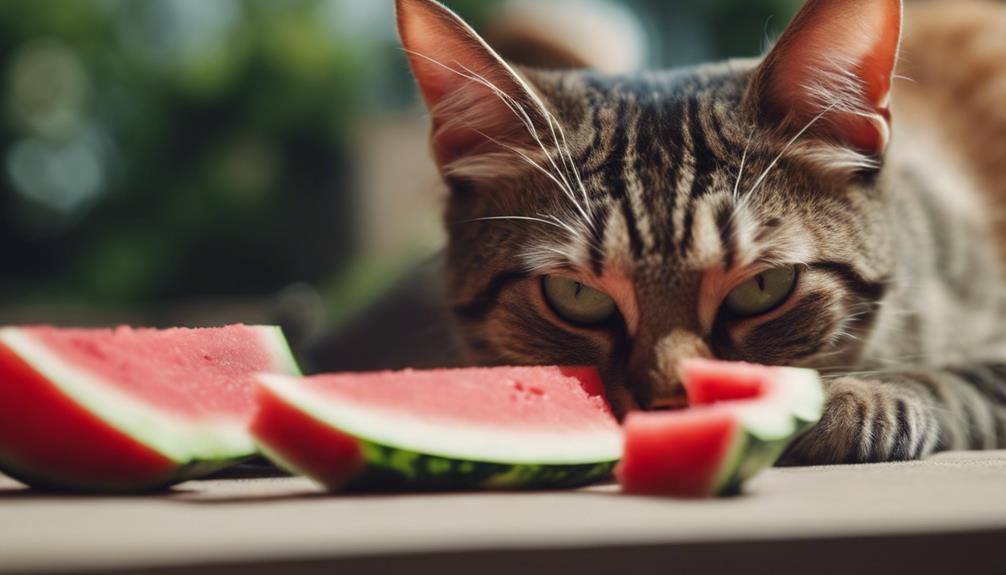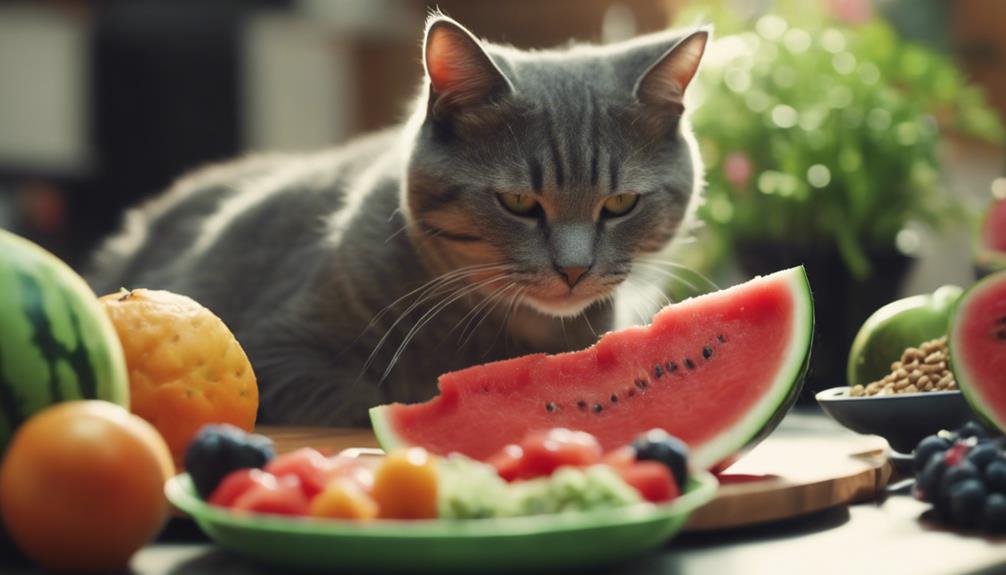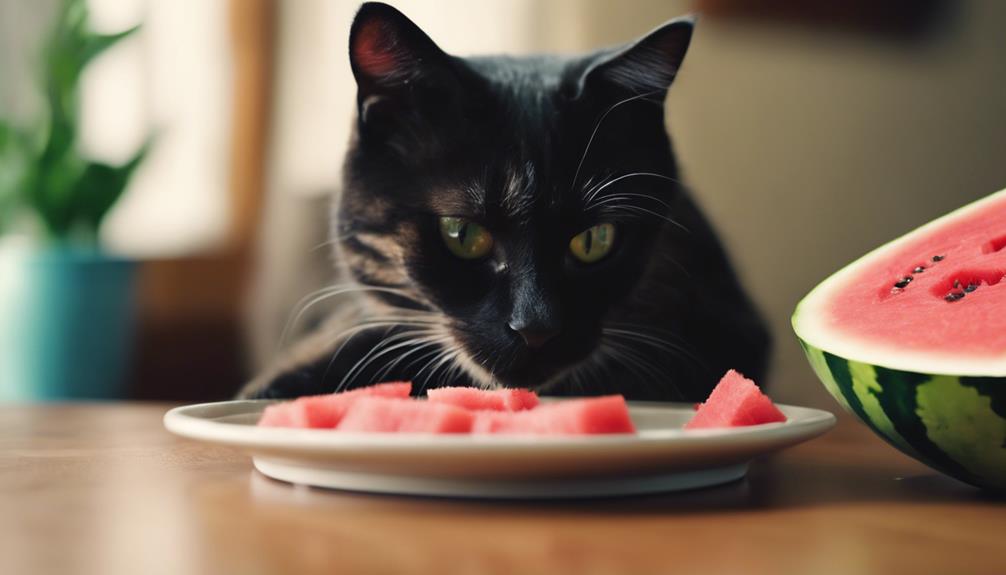As feline enthusiasts, we are often intrigued by the idea of sharing our favorite foods with our beloved cats. The inquiry into whether cats can partake in watermelon consumption raises interesting considerations.
Delving into the intricacies of feline dietary habits and the effects of introducing watermelon into their meals offers a deeper understanding of this matter. While the notion of cats enjoying watermelon may seem appealing, there are crucial factors to explore regarding its impact on our feline friends' health.
Stay tuned to uncover the truth behind cats and their potential relationship with this popular fruit.
Key Takeaways
- Cats do not need watermelon in their diet; prioritize essential nutrients.
- Watermelon can be given occasionally and in moderation.
- Consult a vet before introducing new foods like watermelon.
- Treats like watermelon should not exceed 10% of a cat's daily calories.
Nutritional Considerations for Cats
When considering the nutritional needs of cats, it is essential to recognize that they lack a minimal daily requirement for carbohydrates and are obligate carnivores, thus requiring nutrients primarily from animal products. This means that cats thrive on diets rich in proteins and fats sourced from animal-based foods.
While treats like watermelon may be appealing, they are not a necessary component of a cat's diet. It is crucial to prioritize nutrients over unnecessary additions like fruits, ensuring that cats receive a complete and balanced commercial diet.
Safety and Guidelines for Feeding Cats
Feeding cats watermelon should be approached with caution, considering safety and specific guidelines to ensure their well-being and health. While watermelon is generally safe for healthy cats, individual reactions can vary. It's crucial that the majority of a cat's calories come from a complete and balanced diet.
Watermelon should only be given as an occasional treat and in moderation, especially for cats with health conditions like diabetes. Before introducing new foods like watermelon, consulting your veterinarian is recommended. Treats should not exceed 10% of a cat's daily caloric intake, and it's important to wash, cut, and remove seeds from watermelon before offering it to your feline friend.
Monitoring your cat for any adverse reactions is essential, so introduce new foods slowly and one at a time.
Considerations for Cats Eating Watermelon

Considering the nutritional priorities and potential risks associated with introducing watermelon into a cat's diet, it is important to emphasize that cats do not necessitate the inclusion of watermelon for their dietary needs. Cats thrive on a diet rich in animal-derived nutrients, making watermelon more of a treat than a dietary requirement.
When contemplating offering watermelon to your feline friend, keep the following in mind:
- Cats prioritize nutrients over treats like watermelon.
- Cats may prefer protein-rich foods such as chicken or fish.
- Following feeding guidelines is essential when providing watermelon as an occasional treat.
Benefits and Risks of Watermelon for Cats
Incorporating watermelon into a cat's diet can present both benefits and risks that cat owners should carefully consider. Watermelon can provide hydration, essential vitamins A & C, antioxidants, and support the immune system, all while being low in calories.
However, there are risks to be aware of, including potential digestive issues due to the fruit's high sugar content, the presence of seeds and rind that may pose choking hazards or digestive blockages, and the possibility of allergies in some cats. It is crucial to offer watermelon in moderation to avoid these risks.
If a cat shows any signs of adverse reactions, such as vomiting, diarrhea, lethargy, itchy skin, or swelling, it's best to discontinue feeding watermelon and consult a veterinarian promptly.
Feeding Alternatives and Allergies in Cats

When exploring dietary options for cats, it is essential to consider suitable feeding alternatives and potential allergies that may arise. It's crucial to provide cats with options that meet their nutritional needs while also being mindful of any sensitivities they may have. Here are some key points to keep in mind:
- Cat-Friendly Fruits: Introduce fruits like cantaloupe and blueberries as occasional treats.
- Commercial Cat Treats: Opt for specially formulated treats to ensure balanced nutrition.
- Balanced Cat Food: Prioritize a complete and balanced diet to meet all of your cat's dietary requirements.
Signs of Watermelon Allergies in Cats
Monitoring cats for signs of watermelon allergies is crucial when introducing this fruit into their diet. Cats may exhibit various symptoms if they are allergic to watermelon, such as vomiting, diarrhea, lethargy, itchy skin, or swelling. These signs can indicate an adverse reaction that requires immediate attention.
It is essential to observe your cat closely after feeding them watermelon for the first time to identify any negative responses. If any of these symptoms occur, discontinue feeding watermelon and consult your veterinarian promptly. Being vigilant about your cat's reactions can help prevent potential health issues and ensure their well-being when incorporating new foods like watermelon into their diet.
Summary and Recommendations

After identifying potential signs of watermelon allergies in cats, it is essential to consider key summaries and recommendations for safely including this fruit in their diet.
- Moderation is Key: Watermelon should be given occasionally and in small amounts to prevent digestive issues and excess sugar intake.
- Consult a Veterinarian: Before introducing watermelon or any new food to your cat's diet, seek guidance from a veterinarian to ensure it aligns with their nutritional requirements.
- Observe Your Cat: Monitor your cat for any adverse reactions after trying watermelon, such as vomiting, diarrhea, lethargy, itchy skin, or swelling, and adjust accordingly based on their response.
Conclusion
In conclusion, while watermelon can be a refreshing treat for cats, it is essential to consider their unique dietary needs and potential risks associated with this fruit. By following safety guidelines, monitoring for allergies, and exploring alternative feeding options, pet owners can make informed decisions about incorporating watermelon into their cats' diets.
Understanding the benefits and risks of feeding watermelon to cats is crucial for promoting their overall well-being and ensuring a balanced diet.




